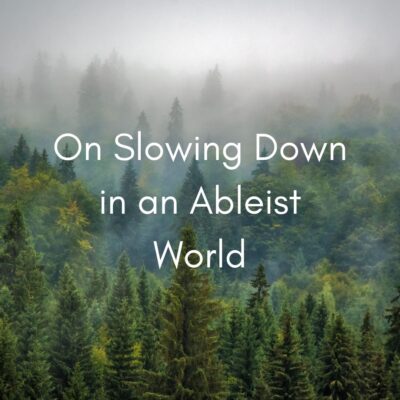April, 2024 ~
Outside, Spring is so bright I can taste her. Bright. Fresh. Sweet. The sky is such a bold blue that all the other colors – migrating birds’ wings, blossoms popping, fresh leaves – are emboldened to their most potent shade. Observing, I find myself pondering how often I have actually paused long enough to smell Spring. Let scent tendrils infuse the lining of my nose.
I’ve written about slowing down, and my need to slow down following surgery. I have spent the last year visibly, temporarily, disabled. Pre and post surgery I was in a wheelchair, my left leg too weak to ambulate. I graduated fairly quickly to a walker, and then “stumbly” to a cane. I finally let go of my cane in late Fall, unless traveling. This graduated experience of disability is eye and heart and mind opening to the daily reality of those living long term with visible and invisible disability. I am learning. I realize how much inconsideration and disrespect my colleagues can endure. When my leg collapsed, I was in Tahiti, which I later learned is high on the list of places for disabled folks to visit. I had a swirl of feelings when I was suddenly in a wheelchair all the time. Immobility was really new for me. In Tahiti, my husband pushed my wheelchair everywhere we went and I was treated with the most profound respect and care. The word we chose to describe both our experiences of this is DIGNITY. That changed the moment we landed at SFO. We were looking for a seat in the crowded lounge, and people literally raced to get to open seats before we did. Only 1 person offered her seat. I have spent a lot of time since then contemplating the origins of discomfort, shame, and marginalization in our disabled and neurodivergent community. It’s hard to source one’s own dignity when environmental cues express intolerance, impatience and sometimes, disgust. Initially when I read those cues I felt angry. Sometimes I said something strong. I realized that only increased the shame or frustration I felt when the person wasn’t a willing listener, which was most often the case. These experiences have me contemplating how often our community of disabled folks have to thicken their skin and soften their hearts to allow a litany of microaggressions roll off of them.
Recently I was visiting friends. A small group had just completed a five mile walk. I watched them depart earlier, wistfully remembering the feeling of a long walk or hike, seeing all the wildflower colors, smelling rain, refreshed when clouds rolled in. At some point in our conversation, one friend said in a self-celebratory way, “Well we all already walked 5 miles and I worked out before that!” We should all celebrate our accomplishments and the tone had just a hint of boastfulness to it. I felt the inner flush I know as shame. The words that formed in my brain’s mouth was “Count your blessings; what a privilege to be able to do all that.” I didn’t say it; I didn’t want to do harm. Those words stayed with me for a while. As I began to “sink” I paused and observed the just blooming Indian Paintbrush and Bluebonnets. That pause, drinking in the color and taste of Spring, was restorative. It melted my sense of aloneness. I recalled a poem a friend sent me, written by a disabled person, that emphasizes s-l-o-w-i-n-g d-o-w-n in every stanza. I wish I could find it because reading it is an embodied experience of what it feels like to be forced to slow down in a society that swirls and speeds around me. I am reminded of all the times I push myself and walk a few extra blocks and then have to move very slowly, which causes others around me to adjust. Often unwillingly. I cannot move faster, and still, people race, push, dart by me in a way that communicates: You are in the way.
There’s more to write. As I continue learning the art of slowing down, I also learn to do less. Be more. This practice of shifting attention to color and light, to intentionally seeking the scent in an inhale, to pausing to notice beauty, stillness, life, is a reset. I practice the art of appreciation. It doesn’t erase the insensitivity and microaggressions. It softens my heart so they roll off my more durable skin.
